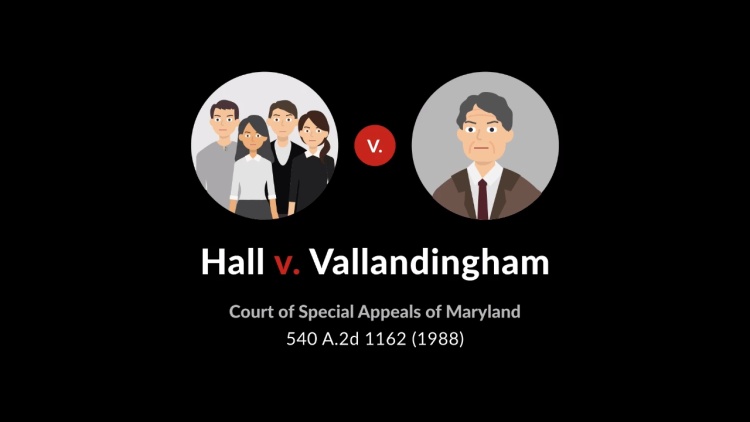Hall v. Vallandingham
Maryland Court of Special Appeals
540 A.2d 1162 (1988)

- Written by Christine Raino, JD
Facts
Earl J. Vallandingham died in 1956, survived by his widow and the couple’s four children. Two years after Earl died, his widow married Jim Walter Killgore, and Killgore adopted Earl’s children. Earl’s brother, William Vallandingham, Jr., died intestate in 1983. William’s only heirs were his surviving brothers and sisters, as well as the children of his brothers and sisters who had predeceased him. After William’s death, Earl’s four children (plaintiffs) brought an action against Joseph W. Vallandingham (defendant), who was William’s twin brother and the personal representative for William’s estate. Earl’s children claimed they were entitled to what would have been Earl’s distributive share of William’s intestate estate because their father had predeceased their uncle. Upon transmittal from the Orphan’s Court, the Circuit Court for St. Mary’s County decided that Earl’s children could not inherit from William, their natural uncle, because they had been adopted by Killgore. Earl’s children appealed to the Maryland Court of Special Appeals, contending that the law governing inheritance rights of natural children implicitly entitled adopted children to inherit from their natural relatives as well as from their adoptive parents.
Rule of Law
Issue
Holding and Reasoning (Gilbert, C.J.)
What to do next…
Here's why 907,000 law students have relied on our case briefs:
- Written by law professors and practitioners, not other law students. 47,100 briefs, keyed to 996 casebooks. Top-notch customer support.
- The right amount of information, includes the facts, issues, rule of law, holding and reasoning, and any concurrences and dissents.
- Access in your classes, works on your mobile and tablet. Massive library of related video lessons and high quality multiple-choice questions.
- Easy to use, uniform format for every case brief. Written in plain English, not in legalese. Our briefs summarize and simplify; they don’t just repeat the court’s language.





